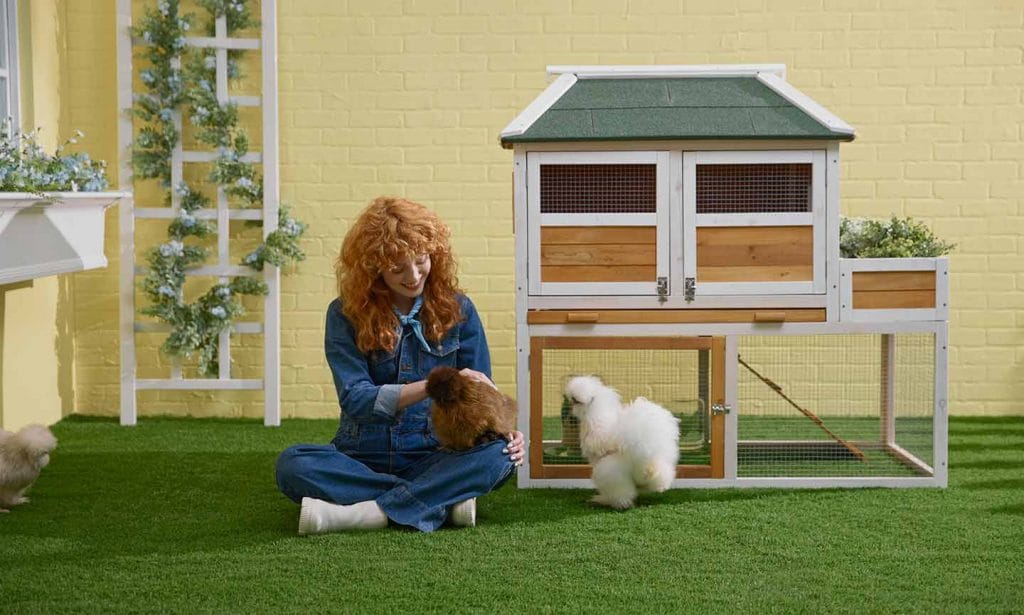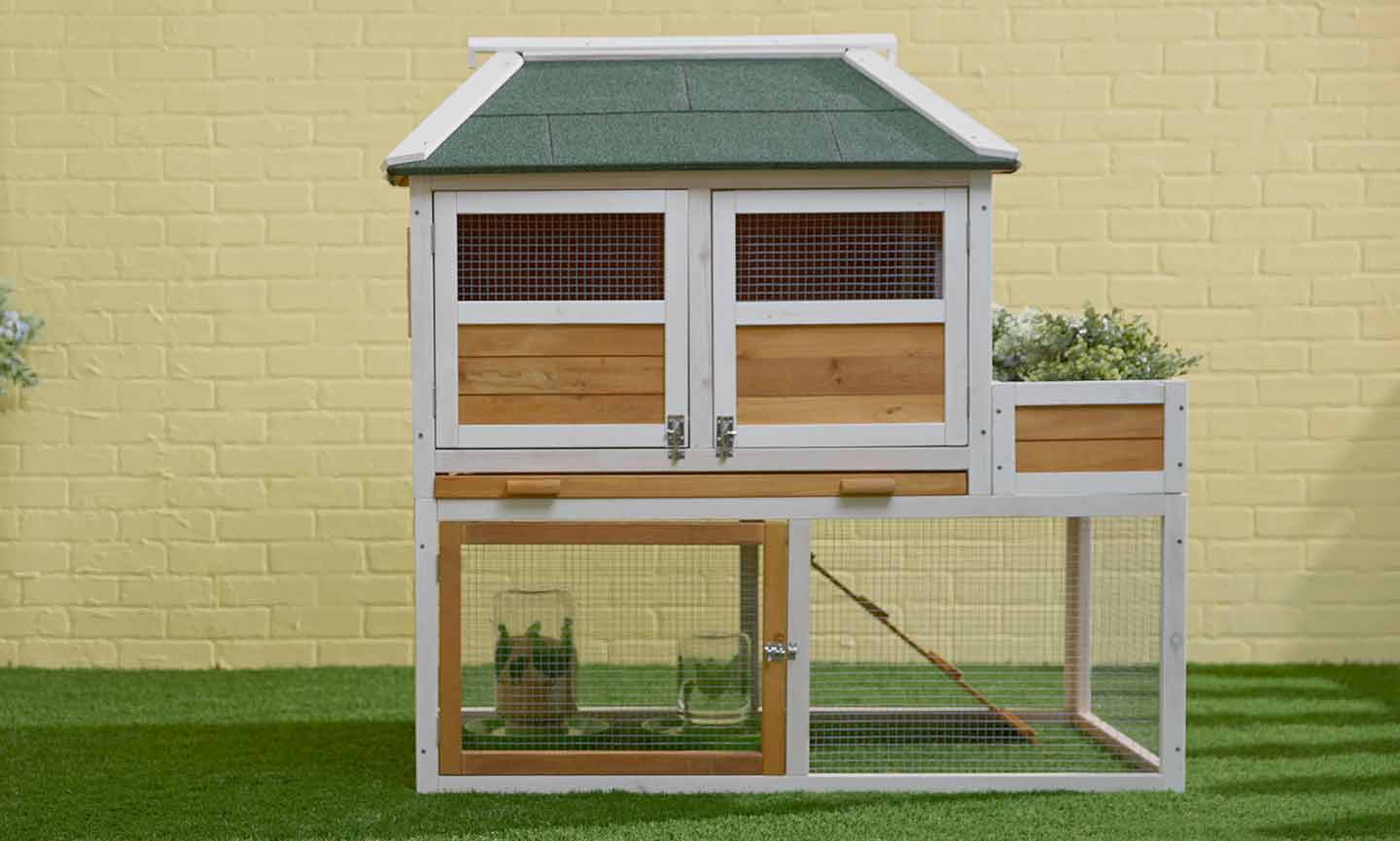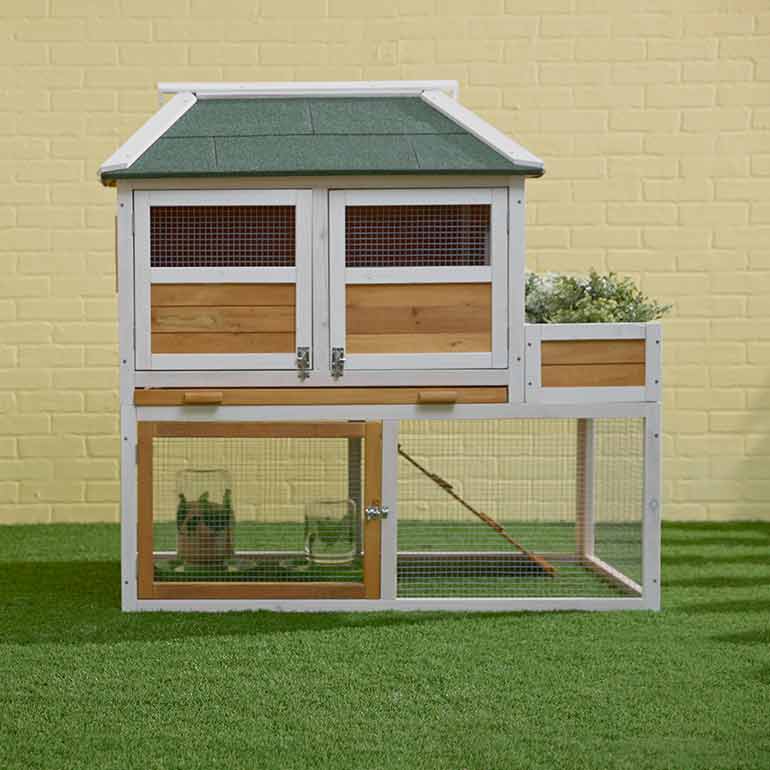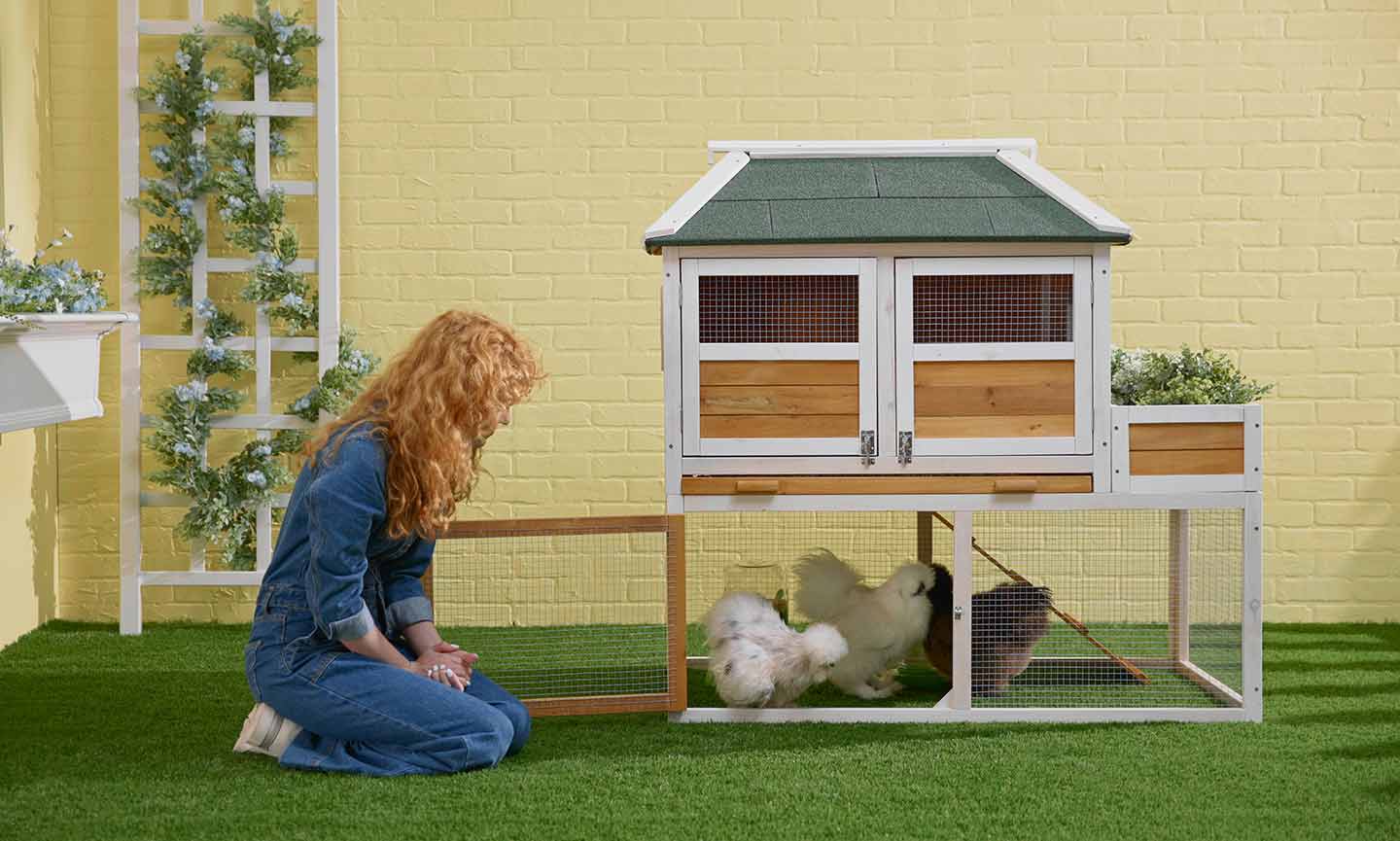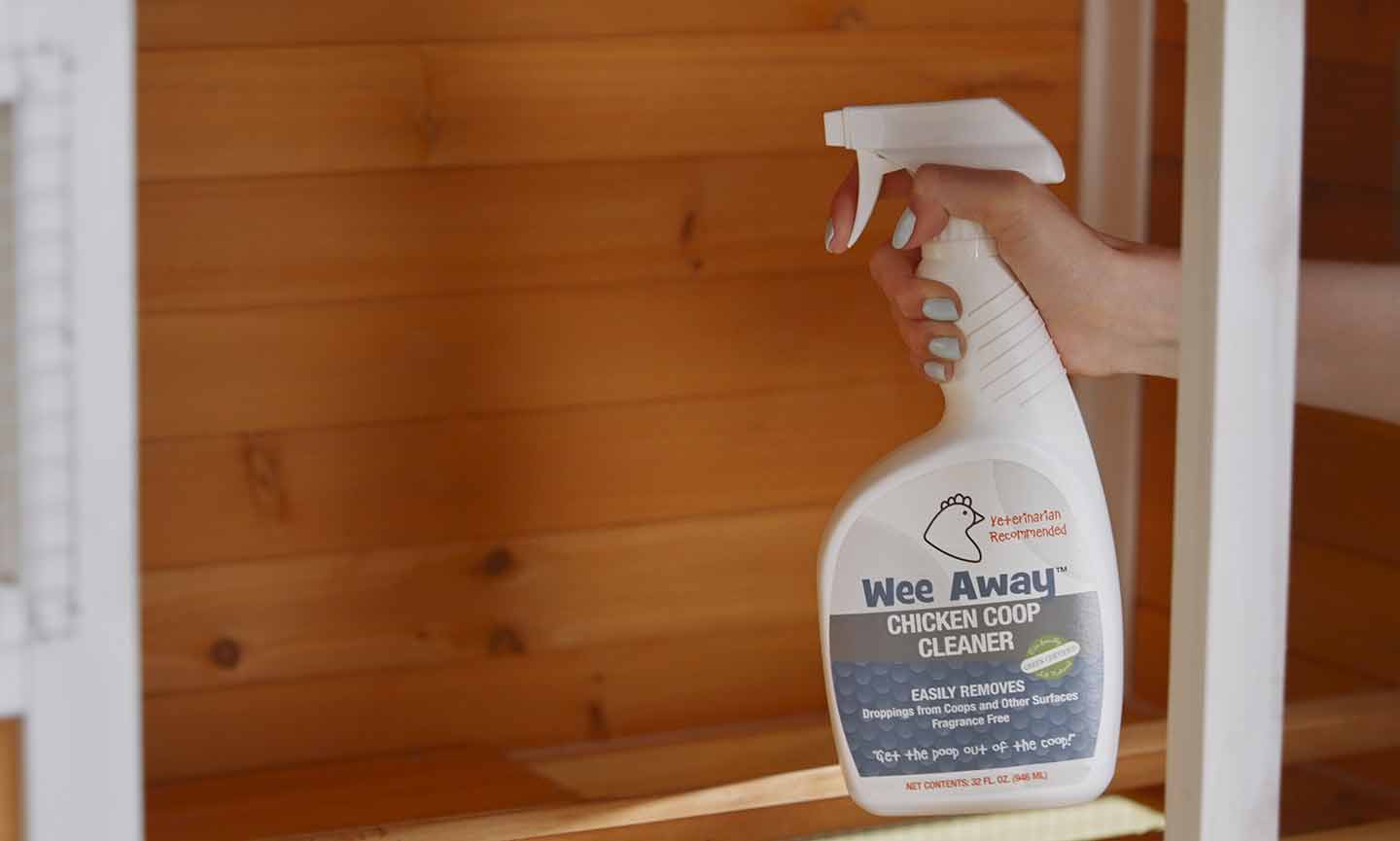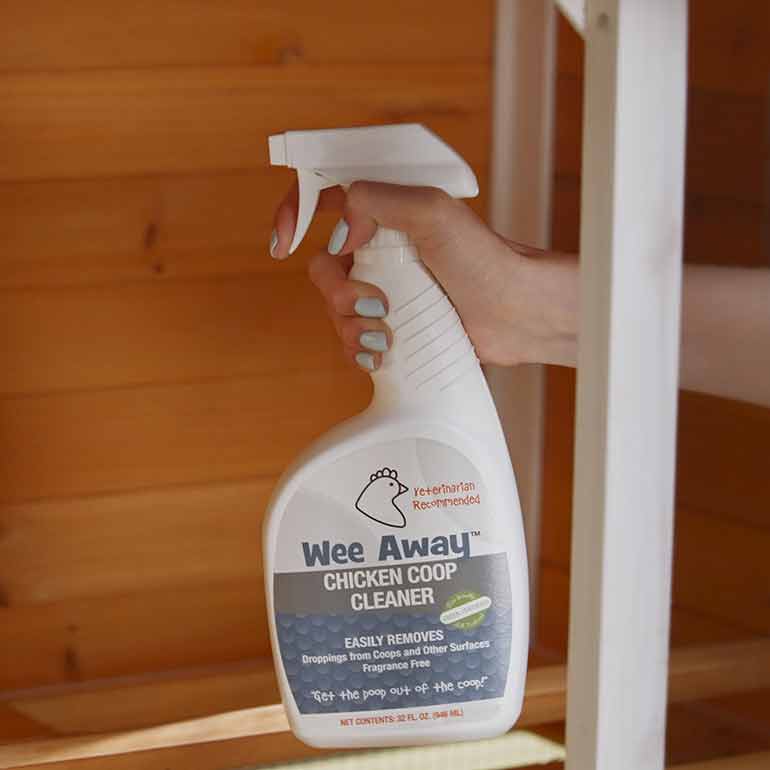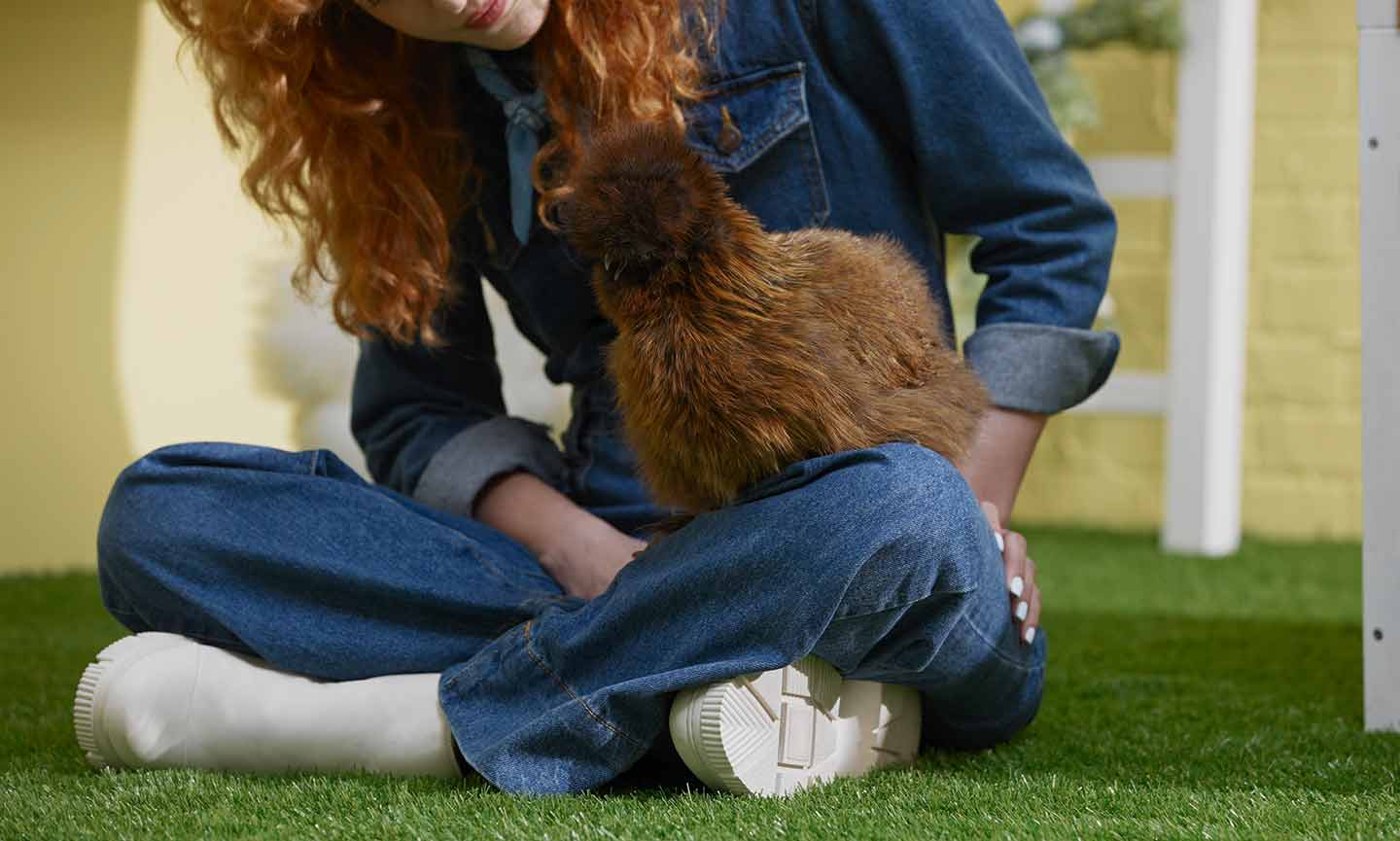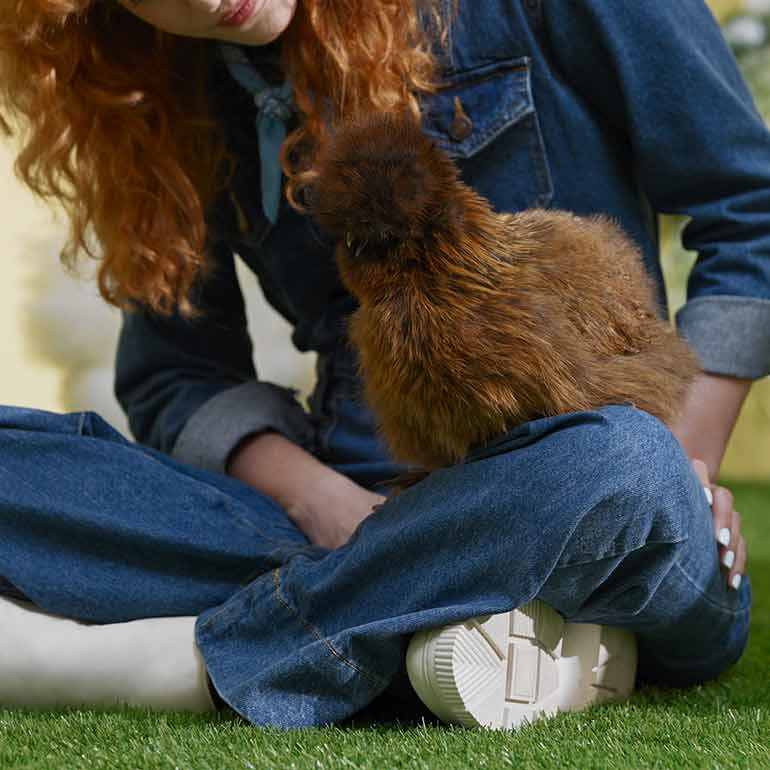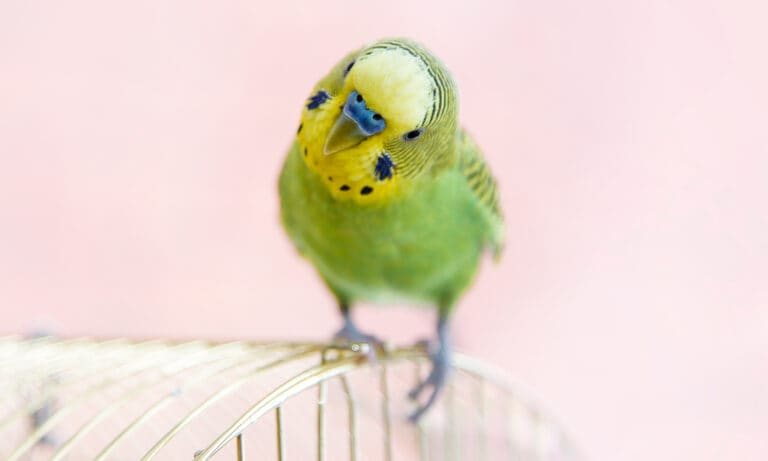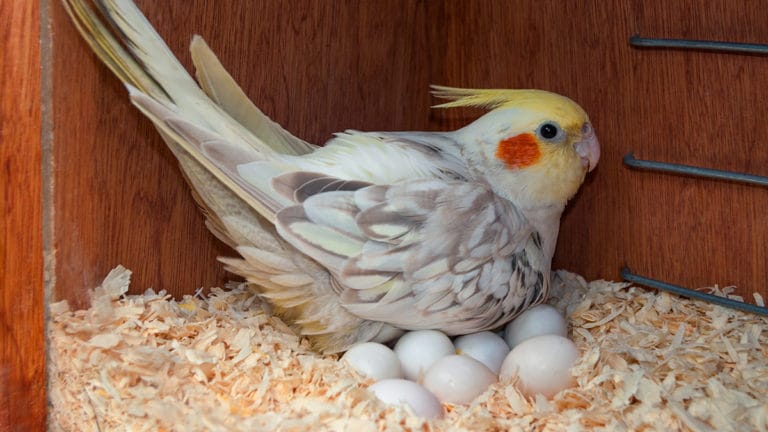Click the buttons to jump to each section:
Am I Ready to Raise Backyard Chickens?
Eager to dive into the world of chicken parenthood? You’ll want to make sure you’re well-prepared and ready to take on the responsibility. Here’s a quick overview of what you’ll need to consider before committing to raising chickens.
Space Required
Good news: You don’t need a huge space to keep chickens! Here’s a basic guide:
- At least 3 square feet of chicken-coop space, per adult chicken
- At least 10 square feet of pen space, per adult chicken
That means a small flock of five or six chickens needs about a 4x6 feet coop and an attached pen or run that’s roughly 6x10 feet, says Lisa Steele, a fifth-generation chicken keeper in Maine and founder of Fresh Eggs Daily. If you can give them more room to roam, even better, she adds—the more space they have, the happier they’ll be.
Starting with five or six chickens is ideal, she says, because these animals are flock-oriented—they like to be around each other. The Farmer’s Almanac recommends starting with no fewer than three, but for these social birds, the bigger the party, the better.
That said, you’ll want to make sure that the backyard space is ideal stomping ground for your friendly fowl. Consider these factors:
- Climate: While chickens are hardy animals who can thrive almost anywhere, Steele says that extreme heat can be hard on them. If you live in a high-heat area, keep chickens cool with shade, fans and ice blocks. Also, make sure they have more than enough water.
- Predators: Foxes, weasels, hawks, eagles, “and even the neighbor’s dog” are potential predators for your chickens, Steele says. Fences around your yard can help, and will prevent your chickens from running into the road as well. You’ll also want to make sure their coop and run is secured so that predators cannot get inside, and that your backyard chickens are safely put to bed every evening (more on that below).
- Chemicals and Toxins: Substances used to treat your yard, such as herbicides or pesticides, as well as swimming pool chemicals can harm your flock. Keep your chickens away from any area of your yard that’s been treated with these substances, and make sure your chickens aren’t able to access your neighbors’ gardens or yards, either.
Daily & Weekly Time Commitment
We’ve got more good news for you! Raising backyard chickens is relatively low maintenance. You’ll spend about 10 to 20 minutes per day tending to them, and then about an hour or two on the weekends.
- In the morning, you’ll let them into their run, and replenish their water and food. At this time, you can also collect fresh eggs and do a quick coop inspection to make sure everything is in order.
- In the afternoon, you can give your chickens a little snack if you’re home.
- At dusk, you’ll lock your chickens back up in their coop for a peaceful night’s rest.
- On weekends, you’ll refresh the coop with fresh bedding and scrub their feeders and waterers.
TMI alert: Chickens will poop just about anywhere they can roam, so if you’re hoping to keep your yard pristine, you’ll have to get used to a lot of cleanup duty—or else, these might not be the pets for you.
Chicken Ordinances
Before diving into the wonderful world of chicken keeping, check into your town’s ordinances. Chickens are becoming more accepted in cities, but there are often limits on the number of birds allowed, and a permit is typically needed for the chicken coop or the chickens themselves.
Steele notes that there are often regulations relating to selling fresh eggs, too. If you’re raising chickens for eggs to sell, then you’ll also want to be aware of those requirements, too.
When in doubt, check the local ordinances or contact an animal control officer for any regulations on the books regarding backyard poultry.
Supplies Needed for Raising Backyard Chickens
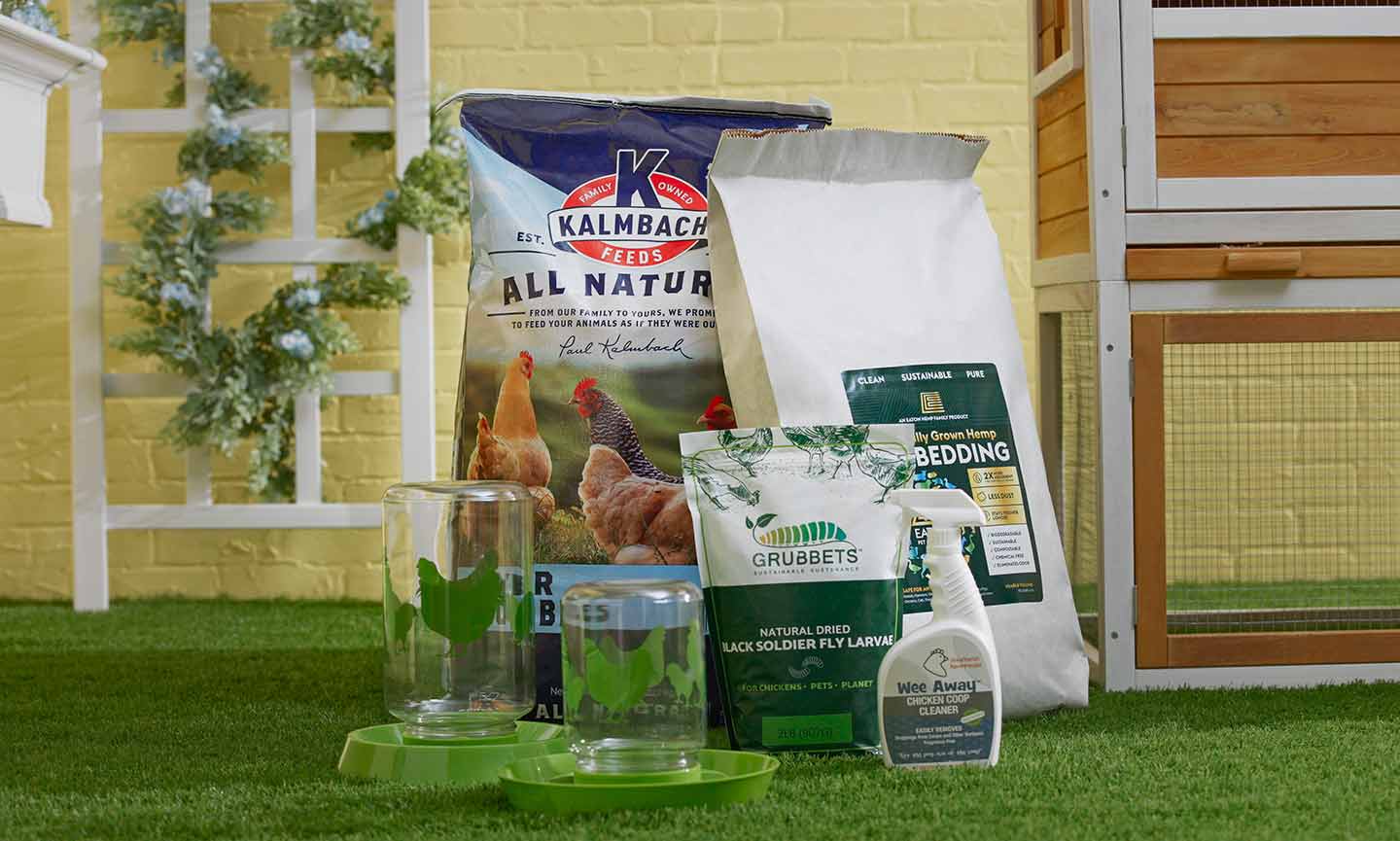
Feeling confident in learning how to raise chickens once and for all? Here are all the supplies you’ll want to gather and keep on hand.
- Chicken coop
- Attached pen
- Bedding
- Chicken feed
- Rodent-proof containers to store the food
- Feeders and waterers
- First aid kit for injuries or minor illness
- Treats and supplements
Read on to learn how to choose the best types of each product.
Backyard Chicken Coops
Whether you build or buy one, the chicken coop will be your greatest expense. This is your chickens’ home, and it’s where they nest, lay eggs and sleep. In addition to the size (at least 3 square feet of space per chicken), you’ll want to ensure your coop is well-ventilated and has enough roosting bar space for each bird to rest or sleep (around 8-10 inches of space per chicken). For pre-made coops, you can expect to pay between $200 and $1,500 depending on size and quality. For a beginner coop, around $300-$500 is a good investment.
The coop needs nesting boxes, too. These create a comfortable place for your chickens to sit and lay eggs. Plan for one box for every two to three hens. (Note: Premade coops often come equipped with nesting boxes.)
You’ll cover the floor of the coop and the nesting boxes with bedding. The bedding should be a nesting material such as pine shavings, corn cob or hemp. These materials typically absorb your chickens’ mess more easily than other common bedding types like straw, making cleanup easier.
Not sure where to start? Check out our guide on how to choose the perfect chicken coop.
Backyard Chicken Pens
An attached chicken pen is also necessary, especially if nobody is home during the day to keep your flock safe. It’s often called a run because it’s a space where your chickens can run around freely. There are two basic requirements for your pen:
- A large enough space (at least 10 square feet per chicken)
- Fully enclosed, with both a roof and walls of fencing or netting (to protect your chickens from predators—or from wandering off)
Many premade coops come with pens, but you’ll want to check that the run is big enough for the size of your flock. If necessary, you can buy or build an additional run to supplement the one that comes with your coop.
Chicken Feed and Water
Chickens need clean, fresh water and feed every day. Feeders and waterers made specifically for chickens are available, but trays, buckets or sturdy containers can work too. Something simple, like Little Giant Hanging Metal Poultry Feeder, is perfect for food. The same company also makes an excellent chicken waterer. It’s also a good idea to invest in a sealed, rodent-proof container to store your chicken feed between feedings, to ensure freshness and protect it from pests. Check out My Favorite Chicken Feedomatic Automatic Chicken Feeder, which is great for rodent control and keeps food free of debris and waste.
What should you look for in chicken feed? It’s important that your feed provides the protein and calcium your chickens need. Those needs will vary depending on the age and type of your chickens, so talk to your vet or a chicken expert at your local hatchery about the right feed for your unique birds.
You can also consider adding supplements to their diet, Steele says. These additions can support your chickens’ health and, if you’re raising chickens for eggs, it’ll affect their quality too. Here are a few common types:
- Calcium
- Brewers’ yeast
- Garlic powder
- Probiotics
- Flaxseed
- Sea kelp
Just like with their feed, your chickens’ supplement needs will vary depending on their age and type. Talk to your vet or chicken expert about supplements for your chickens.
Steele adds that up to 10 percent of a chicken’s diet can be healthy treats, which can vary from garden or kitchen scraps to commercially produced poultry treats. Chickens love all sorts of fruits and vegetables, grains, seeds and nuts, and even meat or fish scraps as well as dried grubs, mealworms, and crickets.
Chicken First Aid Kit
It's a good idea to stock a first aid kit to have on hand for any injuries or minor illnesses your chickens may encounter. This kit should contain:
-
Gauze
-
Tweezers
-
Gloves
-
Vet wrap
-
Saline Flush
-
Petroleum gel
-
Contact info for a vet who treats chickens (in case of emergency)
What constitutes a chicken emergency? Any changes in your birds' food or water consumption, lethargy or low energy levels, diarrhea or other stool changes, and upper respiratory symptoms like congestion are all reasons to call your vet. Plan to have a safe area for any sick or injured chickens to keep them safe and isolated from the rest of the flock.
How to Raise Backyard Chickens: Step-by-Step
If you’ve made it this far, that’s an excellent sign that you’re going to be an amazing backyard chicken parent. To help recap some of what we discussed above, and to give you an even clearer idea of how to raise chickens, read through this step-by-step guide.
1 Set Up Your Coop and Pen
Once you’ve assessed your backyard space to ensure it’s fit for chickens, find the perfect place for the coop and pen. Remember, a small flock of five or six chickens will need about 10 by 16 feet of space total. However, if you have room for a larger pen, that’s even better! The pen should be completely enclosed to keep your chickens in and predators out.
If your chickens are ever allowed outside of the pen (only under supervision), make sure any water sources like ponds or pools are fenced in. The backyard itself should also be fenced to keep your chickens from roaming into a neighbor’s yard or the road.
2 Bring Your Chickens Home
After preparing your chickens’ home and getting all the necessary supplies, it’s time to buy your chickens.
Do I Need a Rooster?
For backyard chickens who provide fresh eggs, you do not need to get a rooster. Roosters will fertilize the eggs your hens lay, which means you’ll be getting new chickens instead of edible eggs. Roosters also crow loudly, and there are more stringent ordinances and regulations in place for keeping them.
Chickens are flock birds, so they prefer to be in a group. Get no fewer than three chickens, and if you have the space for them, five or six is an ideal flock size for a beginner chicken parent. Most backyard chicken hobbyists keep female chickens, aka hens—they’re the ones who produce eggs!
You can get your chickens from a hatchery or farm supply store. Many beginners buy chicks, aka baby chickens; others buy “teenage” chickens called pullets, who are typically around 6 to 8 months old. There are benefits and drawbacks to each:
Chicks
Chickens imprint, or form a strong attachment, to humans when they’re chicks, which can make them easier to manage throughout their lives. Plus, they’re super cute!
Brooding chicks (first 2 weeks of life) is more labor intensive at first, because they need a smaller enclosure and supplemental heat. Also, most breeds of chickens don’t produce eggs until they are 6-8 months old, so if you opt for chicks, you’ll have to wait.
Pullets
You’ll start getting eggs almost immediately!
Your chickens may be less attached to you; they’re still cute, but they’re not tiny, soft baby chick-cute.
3 Tend to Your Flock Daily
Every morning, you’ll need to let your flock out of their coop and into their pen so they can exercise and move throughout the day. You’ll also want to give them some fresh water and food, collect their eggs and do a light inspection of your chickens to make sure they’re looking happy and healthy (more on that below).
In the afternoon or evening you can give them a snack before placing them back in their coop around dusk.
4 Clean the Coop and Pen Weekly
Along with your daily maintenance, you’ll want to allocate about an hour or two every week to refresh your chicken’s bedding and scrub their feeder and waterer. Natural cleaning products such as vinegar can be helpful in high traffic and other really dirty areas. Be sure to remove any debris before applying cleaner—it won’t be effective on organic materials like dirt, debris or poop.
Adding a level of biosecurity for your flock is the most supportive measure you can take to limit any infections/transmissible disease. These measures help keep your babies safer and limit concerns with egg consumption.
- Having a pair of “chicken” shoes or dirty shoes that stay in the flock
- Wellness care from your vet
- Not sharing equipment with other “flocks” or farms
- Good pest control and mosquito control
5 Look Out for Potential Health Issues
Just like any other animal, birds are susceptible to falling ill. You’ll want to check your backyard chickens for signs of illness daily. These can include:
- Lethargy
- Lying down
- Fluffed feathers
- Not wanting to eat (even treats) or drink water
- Standing with eyes closed or head down
- Birds huddled together (flock illness)
- Runny droppings
- Bleeding
- Limping
- Black spots on their combs or wattles
- Runny eyes or nostrils
- Missing feathers
- Black spots on the bottom of the feet
The more time you spend with your chickens, the more you’ll get to know their typical energy levels and personalities—and the more likely you’ll be to notice signs of illness and injury.
Vaccines for chicks and chickens can help limit diseases, but not all potential health risks. By providing them with a clean environment, as well as plenty of exercise and sunshine, further reduces risk of illness and sets up your flock for a happy long life.
Additionally, implementing biosecurity measures and knowing your babies well (noticing even subtle changes) to identify possible illnesses early is key to keeping them healthy.
Steele also notes that routine vet visits you’d do for a cat or dog aren't necessary for most flocks. Establishing communication with a local veterinarian or state extension service is a great approach to ensure you have support with your babes should any issues arise However, it’s a good to have a first aid kit on hand with basics like gauze, vet wrap such as Andover Healthcare PetFlex to hold the gauze in place, and tweezers, as well as the contact information for a nearby vet who treats chickens, in case they fall ill.
Backyard Chickens: FAQs
Q:
How many eggs does a chicken lay each day?
Q:
Are backyard chickens high-maintenance?
Q:
What do you need in a chicken coop?
Q:
Can I raise chickens in my backyard?
The following experts contributed to this report: Lisa Steele, a fifth-generation chicken keeper in Maine and founder of Fresh Eggs Daily; and experienced backyard chicken enthusiasts Bryce Gruber and Jillian Eckerle.
This content was medically reviewed by Chewy vets.
Read More
- How to Choose the Perfect Chicken Coop for Your Backyard
- Dog-Friendly Backyard Ideas That’ll Turn Your Space into a K9 Oasis
- Bird Watching 101: Setting Up Your Backyard Bird Feeder
- Top Bird Names: 200+ Unique, Funny & Catchy Bird Names
- The Larger-Than-Life Story of How Esther the Wonder Pig Inspired a Sanctuary for Farm Animals
Share:
